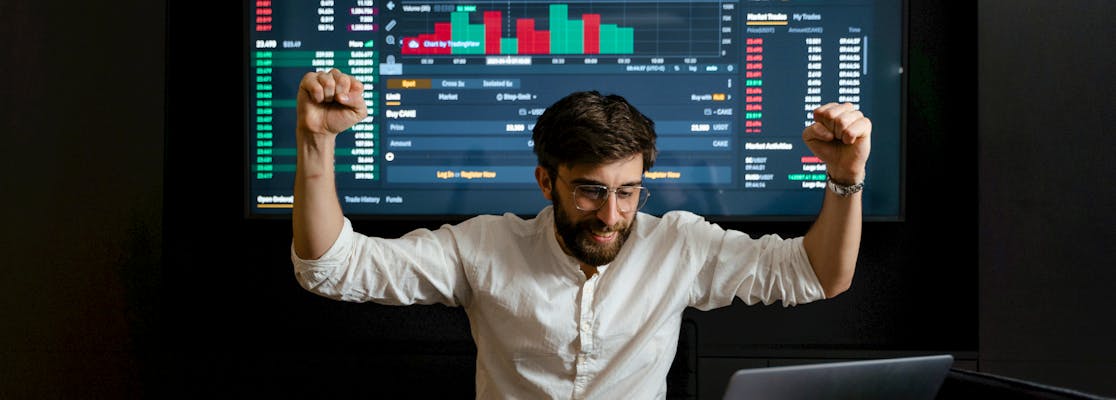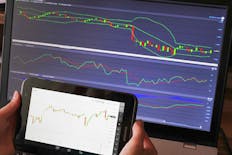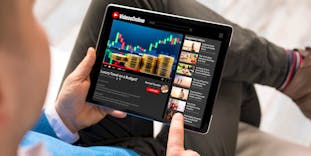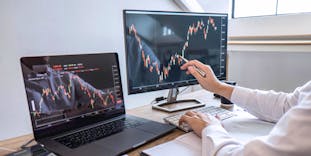How to Practice and Improve Trading With a Demo Account (2026 Guide)
All products and services featured are independently selected by WikiJob. When you register or purchase through links on this page, we may earn a commission.
61% of retail investor accounts lose money when trading CFDs with eToro. You should consider whether you understand how CFDs work, and whether you can afford to take the high risk of losing your money.
- A List of the Top Demo Trading Accounts in January 2026:
- Description of the Best Demo Trading Accounts in January 2026
- What Is a Demo Trading Account?
- What Is the Difference Between a Demo Trading Account and a Live Trading Account?
empty
empty
empty
empty
- How to Choose a Trading Demo Account
empty
empty
empty
empty
empty
- Pros and Cons of Using a Trading Demo Account
empty
empty
- How Does a Trading Demo Account Work?
- What Is the Maximum I Can Trade on a Demo Account?
- Why Set Up a Trading Demo Account?
empty
empty
empty
empty
empty
- How to Use a Demo Account For Trading
- How to Set Up a Demo Trading Account
- Frequently Asked Questions
- Final Thoughts
A List of the Top Demo Trading Accounts in January 2026:
- Pepperstone
- AvaTrade
- eToro
- Plus500
- IG
- Saxo
- ActivTrades
- Vantage Markets
- Switch Markets
- XTB
- ProfitFarmers – The World's First Free Crypto Trading Co-Pilot
Description of the Best Demo Trading Accounts in January 2026
1. Pepperstone
Pros
- Extensively regulated
- No minimum deposit
- Low fees and mostly free withdrawals
- Good customer service
Cons
- No investor protection for clients outside UK, EU and EEA
- Withdrawal fee for international bank wires
- CFDs only
- Accounts are credited with up to $50,000 for practice trading
- Free trial lasts 60 days
- Trade CFDs in: Forex, Crypto (based on jurisdiction) commodities, indices, shares and ETFs
- Educational tools and resources available to use
Pepperstone offers a demo account option for traders who want to practice trading without using real money.
A demo account from Pepperstone provides you with a simulated trading environment where you can execute trades, test strategies, and familiarize yourself with the platform's features without any financial risk.
2. AvaTrade
Pros
- Highly regulated
- Free deposit and withdrawal
- No Commission
- Low minimum deposit
- Social and copy trading
Cons
- Not available for US clients
- Inactivity fees
AvaTrade, established in 2006, is a leading multinational online brokerage platform recognized for its user-friendly design and robust features, making it an ideal choice for traders, especially those utilizing a demo account.
Furthermore, AvaTrade's commitment to providing a risk-free environment for beginners stands out through its accessible demo accounts, enabling users to practice trading strategies and familiarize themselves with the platform's functionalities before venturing into live trading.
AvaTrade has more than 200,000 registered clients that make approximately two million trades a month, worth more than £60 billion.
It offers diverse trading instruments, including forex, stocks, commodities, cryptocurrencies, and indices, ensuring traders have ample opportunities to diversify their portfolios.
AvaTrade operates in Europe, Australia and Asia and is regulated by CBI, FSA, B.V.I FSC, ASIC, FSCA, FSA/FFAJ and FRSA.
3. eToro
Pros
- Regulated by FCA, ASIC
- No withdrawal fee for US clients
- 0% commission on stocks
- Social and copy trading
Cons
- Not available in every US State
- More expensive than most of its competitors
- No MetaTrader platforms
Below content does not apply to US users
Founded in 2007, eToro is considered a very low-risk broker as it is highly regulated by the Financial Conduct Authority (FCA) in the UK and many other regulatory bodies elsewhere.
eToro offers a demo account option for users who want to practice trading without risking real money.
A demo account on eToro allows you to simulate trading in a virtual environment using virtual funds.
This is a great way for beginners to learn about the platform, explore different trading strategies, and get a feel for how trading works on eToro.
To find out more, read our eToro review.
61% of retail investor accounts lose money when trading CFDs with eToro. You should consider whether you understand how CFDs work, and whether you can afford to take the high risk of losing your money.
4. Plus500
Pros
- No buy/sell commissions and tight spreads
- Leverage of up to 1:30
- FREE unlimited Demo
- 2,800+ trading instruments
- Real-time quotes and advanced analytical tools
- Fast and reliable order execution
Cons
- No API integrations
- No social copy trading
- Ability to switch between live trading and demo mode
- Trade on CFDs on underlying financial instruments such as Indices, forex, commodities, shares, options and ETFs
- No time limit for demo accounts
5. IG
Pros
- Highly regulated
- MetaTrader 4 (MT4)
- Over 10,000 instruments
- Available in the UK and US
- 24/7 customer support
Cons
- High fees
- No deposit compensation scheme for US accounts
- No copy trading
- Inactivity fees
IG invented spread betting in 1974 and today is the world’s leading online trading provider with more traders trusting them with their money than anyone else.
IG is authorised and regulated by the FCA and provides traders access to over 18,000 markets.
IG's demo account is a valuable feature that allows users to experience trading on the IG platform without using real money.
It's designed to provide a risk-free environment for both novice and experienced traders to practice trading strategies, learn how the platform functions, and gain familiarity with the trading tools and features offered by IG.
Key features of IG's demo account may include:
- Simulated Trading: Users can execute trades using virtual funds, mimicking real market conditions without the actual financial risk.
- Real-Time Market Data: The demo account typically offers access to real-time market data, allowing users to monitor price movements and make informed decisions.
- Testing Strategies: Traders can test various trading strategies, explore different assets, and assess the effectiveness of their approaches.
- Charting Tools: The demo account often provides access to charting tools and technical indicators, helping users analyze price trends and patterns.
- Risk-Free Learning: For beginners, the demo account offers a safe environment to learn about trading concepts, order types, and risk management.
- Platform Familiarization: Users can become familiar with the layout and functionality of the trading platform, which can be beneficial when transitioning to live trading.
It's important to note that while demo accounts provide a realistic trading experience, there are differences between trading in a simulated environment and real market conditions. Prices and execution speeds in a demo account may not accurately reflect those in live trading. Therefore, users should still exercise caution and gradually transition to live trading once they feel confident.
6. Saxo
Pros
- Heavily regulated
- Good product portfolio
- Low forex fees
- No withdrawal or inactivity fees
Cons
- Does not accept US clients
- High fees for options, futures and bonds
Saxo offers a demo account that serves as an excellent tool for both new and experienced traders to familiarize themselves with trading platforms and strategies without any financial risk.
The demo account allows you to trade with virtual money, which means you can experiment with different trading strategies, learn how to use the platform, and understand market movements without the risk of losing real money.
Saxo’s demo account simulates real market conditions. This includes real-time prices and the full range of tools available on Saxo’s live platforms, making the experience as close to actual trading as possible.
Users of the demo account have access to the same wide range of instruments and features as live account holders. This includes stocks, forex, CFDs, commodities, and more, across Saxo’s advanced trading
While using the demo account, traders can also access Saxo’s vast array of educational materials. These resources are designed to enhance trading knowledge and skills, covering topics from basic trading principles to advanced strategies and market analysis.
Typically, Saxo's demo accounts are available for a limited period, which can be around 20 days, providing ample time to get accustomed to the platform and its features.
The demo account is free to use, requiring no financial commitment or risk, making it an invaluable tool for anyone looking to improve their trading skills or explore Saxo’s trading environment.
7. ActivTrades
Pros
- Regulation and security
- Range of instruments
- Educational resources
- No dealing desk (NDD) execution
Cons
- Limited research tools
- Spreads and fees
- Limited cryptocurrency selection
ActivTrades is a traditional CFD broker and has been trading for more than 20 years on 140 markets. ActivTrades is authorized and regulated by the FCA, CSSF and SCB.
Its strong points include:
- No minimum first-time deposit
- No commissions
- Several payment methods for deposits and withdrawals
- Tight spreads from 0.5 pips
The ActivTrades demo account offers a risk-free gateway into the world of trading, allowing both novice and experienced traders to refine their skills and strategies without any financial exposure.
The demo account replicates real market conditions, providing you with a genuine trading experience. You can access real-time market data, observe price movements, and execute trades just as you would on a live account.
Once you feel confident in your trading skills and strategies, you can consider transitioning to live trading with real funds. The experience gained from the demo account can help you make more informed decisions.
Spread betting allows UK residents ONLY to trade the prices of financial instruments, including forex, indices, commodities and LSE shares.
8. Vantage Markets
Pros
- Regulated by FCA, ASIC and VFSC
- Low forex fees
- No inactivity fee
- No withdrawal or deposit fee
- Good MetaTrader add-ons
- Social trading
Cons
- CFD trading carries risk
- $50 is needed to start trading
Vantage Markets was founded in 2008 to be a transparent forex broker and has grown to include 40+ forex pairs and over 1,000 different assets including EFTs.
As a broker, Vantage Markets is well-regarded and considered safe thanks to regulation by ASIC, FCA and VFSC.
Vantage Markets offers access to the markets through the popular MT4 and MT5 platforms, and a feature-stuffed mobile app.
There are three account types:
- Standard STP. Perfect for novices, this is a no-commission account that works across all trading instruments, with a minimum spread of 1.0 pips. The minimum deposit is $50.
- Raw ECN. Designed for more experienced traders, this account charges commission at $3 per lot per side but the spreads start at 0.0 pips. The minimum deposit is $500.
- Pro ECN. This is for professional, high volume traders, and offers commission at 1.5 per lot per side, with spreads from 0.0 pips. The minimum deposit is \20,000.
Vantage Markets is seen as a good, reliable broker that offers social and copy trading – without being prohibitively expensive in terms of non-trading costs or commission.
For traders looking to deal exclusively in forex, the Vantage Markets offering is limited but well-crafted. There is no proprietary platform, but users can trade on MetaTrader 4 and 5.
Social and copy trading is available with ZuluTrade, DupliTrade and the myfxbook AutoTrade, and with both MT4 and 5 Expert Advisors can be used for algorithmic trading.
For beginners, there is not much education available with Vantage Markets, so it might be more suitable for a trader that has some experience, and the research provided is mostly from third party sources. Vantage Markets has a YouTube channel and there are daily trading videos posted there.
Vantage Markets allows for fast executions and is transparent on pricing, with good customer service.
9. Switch Markets
Pros
- Regulated by ASIC
- Low minimum deposits
- No deposit fee
- No inactivity fee
- Free VPS
- Social trading
- Tight spreads
- Useful trading tools and research
Cons
- No US clients
- Not FCA regulated
Switch Markets, known for providing online trading services, offers a demo account feature that allows users to practice trading in a simulated environment.
The demo account offers a risk-free platform for users to practice trading. You can experiment with different trading strategies and get familiar with the market dynamics without risking real money.
The demo account typically replicates real market conditions. This includes access to real-time market data, allowing you to experience what actual trading feels like.
Users are provided with a certain amount of virtual funds to use for trading. This enables you to engage in various trades and test out strategies as you would with a live account, but without financial risk.
The demo account is an excellent way to get accustomed to the Switch Markets trading platform. You can learn how to navigate the platform, execute trades, use different tools, and understand the functionalities available.
It serves as an educational tool, especially beneficial for beginners. You can learn the basics of trading, understand different financial instruments, and grasp the nuances of market analysis.
More experienced traders can use the demo account to test new trading strategies and ideas, assess risk management techniques, and experiment with different asset classes.
Once you feel confident with your trading skills and strategy in the demo environment, you can transition to a live trading account. This step involves trading with real capital and facing actual market risks.
10. XTB
Pros
- Regulated by the FCA
- Low forex fees
- Fast withdrawal and deposit with no fee
- Live chat customer service
Cons
- No US clients
- Limited product portfolio
- High fees for stock CFDs
- Accounts are credited with $100,000 for demo trading
- Four weeks of free trading practice
- Trade on: Forex, indices, commodities and shares
- 24-hour customer support
The XTB demo account is an excellent way for beginners to become familiar with the trading platform's interface, tools, and features. This can help build confidence before transitioning to live trading.
CFDs are complex instruments and come with a high risk of losing money rapidly due to leverage. 69-80% of retail investor accounts lose money when trading CFDs with this provider. You should consider whether you understand how CFDs work and whether you can afford to take the high risk of losing your money.
11. ProfitFarmers – The World's First Free Crypto Trading Co-Pilot
Pros
- Trading signals and strategies
- Automated trading
- User-friendly interface
- Variety of trading pairs
- Transparency
Cons
- Reliance on signals
- Subscription cost
ProfitFarmers is a semi-automatic copy trading platform that produces AI trading signals combined with education and advanced tools to trade better and no trading experience is needed. They are partnered with Binance.com exchange to buy/sell cryptocurrencies that are paired in BTC, USDT, and BUSD and offer an affiliate program to anyone who wants to promote their product.
Sign up now to use their platform for free and upgrade to their $21 trial offer for 21 days to access all their features!
- Copy trading signals
- Advance Features (Trade Guardian, Laddering Mode, Market updates, etc.)
- Trade Doctor/Session with one of their trading expert
- Pro trader 5x blueprint (helps you 5x your account)
- And many more
Visit ProfitFarmers – The World's First Free Crypto Trading Co-Pilot

What Is a Demo Trading Account?
When someone decides to trade on the stock market for the first time, they might not know what to expect, how to complete trades or when to buy or sell.
Reading about the process will give a certain amount of knowledge, but some things need to be learned first-hand to be properly understood.
This is why some platforms introduced the concept of demo trading platforms.
Essentially, they are exactly as the name would suggest: a platform that demonstrates how trading is done.
A demo platform offers the opportunity for you to familiarize yourself with the way a specific platform looks and operates without the need to invest large sums of money.
They are designed as a training tool to learn how to trade on the stock markets while ensuring that no real capital is at risk.
Demo accounts are also a good way for you to test out different trading strategies and find a style that suits you.
You can test out different trading methods and levels of risk to find a method that suits your needs and personal preferences.
Alternatively, you will be able to create a trading style that is unique to you.
What Is the Difference Between a Demo Trading Account and a Live Trading Account?
A demo trading account and a live trading account differ in several ways:
Real Money
Demo accounts are designed for traders to practice their skills and test trading strategies without risking real money.
Demo accounts often come with a virtual balance of fake money that traders can use to place trades and experiment with different strategies.
On the other hand, live trading accounts involve trading with real money, which means that any profits or losses are real.
Market Conditions
Demo accounts simulate market conditions but do not always accurately reflect real market conditions.
For example, demo accounts may not account for slippage or market volatility, which can affect the accuracy of trading strategies.
In contrast, live trading accounts reflect real market conditions, which means that traders must be prepared to adapt to market changes.
Emotions
Trading with a demo account does not involve the emotional impact of losing real money, whereas trading with a live account can be influenced by emotions such as fear and greed.
Traders who experience success with a demo account may become overconfident and take on more risk when trading with a live account, which can lead to losses.
Execution
The execution of trades can also differ between demo and live accounts. Demo accounts may execute trades quickly without delays, whereas live accounts may be subject to slippage, requotes and other trading conditions that can affect the outcome of a trade.
How to Choose a Trading Demo Account
Choosing a trading demo account can be an important step in learning how to trade financial instruments such as stocks, forex and cryptocurrencies.
Here are some factors to consider when choosing a trading demo account:
Features and Functionality
Look for a demo account that has similar features and functionality as the real trading platform.
This will give you a better idea of what it will be like to trade with real money.
Real-Time Market Data
Make sure the demo account provides real-time market data, so you can practice trading in real market conditions.
Account Balance
Look for a demo account that offers a balance similar to what you plan to trade with in the future.
This will help you practice managing your funds and making trades with the right amount of capital.
Duration of the Demo Account
Choose a demo account that offers an adequate amount of time to practice trading.
Some demo accounts may only be available for a few days or weeks, while others may offer unlimited access.
Reputation of the Broker
Choose a broker with a good reputation and a strong track record of providing reliable trading platforms and customer support.
Pros and Cons of Using a Trading Demo Account
Pros
- No risk attached
- Learn how a platform works
- Test out trading theories
- Decide on your individual risk preferences
- Confidence building
- Access to educational resources
Cons
- Limited market conditions
- Complacency
- Bad habits
- Increased risk-taking
- Lack of emotional impact
- Limited access
When done properly, trading can be hugely beneficial and using a demo platform will enable you to make better choices when it comes to using a real platform and real money.
This doesn’t mean, however, that there are no disadvantages.
It is important to also consider the potential disadvantages and be aware of them to avoid the pitfalls that can occur.
Pros
-
No risk attached – Unlike when you trade on the real stock markets, there is no risk attached to using a demo account
-
An opportunity to learn how a platform works – Each platform is slightly different, so it can be useful to use trading platforms to discover what the functions of each platform are before committing to using it.
-
Test out trading theories – There are many different trading methods, and you will need to find the right one for you. Demo accounts can help you to decide which strategies you prefer.
-
Decide on your individual risk preferences – Trading always holds an element of risk. You will need to learn how much risk you can manage and how to avoid taking unnecessary or dangerous risks.
-
Confidence building – Successfully trading with a demo account can help traders to build confidence in their abilities and increase their chances of success when trading with real money.
-
Access to educational resources – Many brokers offer demo accounts along with educational resources such as webinars, tutorials, and articles to help traders improve their skills.
Cons
-
Limited market conditions – Demo accounts may not always replicate real market conditions, such as slippage or market volatility, which can impact the accuracy of your trading strategies.
-
Complacency – Because you aren’t really risking real money with a demo platform, it can make you become complacent, as you don’t see the money that you gain or lose as being real. This can mean that you are less careful with the strategies you choose and pay less attention to market changes.
-
Bad habits – When you are trading with money that isn’t real, it’s easy to develop bad habits. You will need to be aware of this when using your demo account to ensure that you are aware of any bad habits before they become an issue.
-
Increased risk-taking – You won’t be losing or gaining anything in real life. A demo account is entirely there for practice and developing skills. This can mean that you are more likely to take dangerous risks that you wouldn’t take if you were using real money. It can also mean that dangerous habits are more likely to be used when it comes to trading for real.
-
Lack of emotional impact – When trading with a demo account, there is no emotional impact of losing real money, which can make it difficult to fully simulate the experience of trading with real funds.
-
Limited access – Some demo accounts may only be available for a limited time or may have limited features, which may not provide sufficient opportunities to practice and improve trading skills.
How Does a Trading Demo Account Work?
A demo account works by allowing individuals to practice using a trading platform without taking risks with their own money.
It will have all of the features of a live trading platform without the risks. This enables you to learn how platforms work and develop strategies without the risk of losing money.
The fact that a demo account isn’t live means that you won’t lose money, although it does also mean that you can’t gain money, either.
The objective is to learn discipline and develop strategies that minimize risk when it comes to trading for real.
What Is the Maximum I Can Trade on a Demo Account?
The maximum amount that you can trade on a demo account varies depending on the broker or platform that you are using.
Some brokers may offer a predetermined amount of virtual funds for demo trading, while others may allow you to set the amount of virtual funds that you wish to trade with.
In general, the amount of virtual funds offered for demo trading is usually sufficient for traders to practice their trading strategies and get a feel for the trading platform.
However, it is important to remember that trading with a demo account is not the same as trading with a live account, and the results of demo trading may not always accurately reflect real market conditions.
It is recommended to start with a demo account with a virtual fund size that matches your intended live account size.
For example, if you plan to start trading with $10,000, it may be a good idea to use a demo account with a virtual fund size of $10,000 or higher, to get a realistic experience and practice your trading strategy accordingly.
Why Set Up a Trading Demo Account?
If you are considering investing in the stock market, then there are many reasons why you might consider setting up a demo account first.
Familiarizing Yourself With a Platform
Different platforms will work in slightly different ways. So, whether you are brand new to the world of online trading or simply moving from one platform to another, it can be a good idea to set up a demo account.
This will enable you to get to grips with the intricacies and features of a platform without the risk of losing any money.
Learning Rules and Functions
Different platforms will work in different ways. Demo platforms are an ideal way to learn the rules and functions of each platform and the general rules associated with trading.
This will help you to avoid making mistakes when it comes to trading with your own money.
Developing and Improving Your Trading Strategy
By practicing with a demo account, you will be able to develop a strategy that works for you. You will also be able to find ways to improve this.
This means that you will be able to personalize your strategy to suit your needs.
Experimenting With Risk
Trading never comes without some level of risk that is involved in every transaction that you will make.
Accepting this is important, as it will help you know the risks you are comfortable with and the ones that make you anxious or uncomfortable.
Demo accounts can help you to discover where your personal limits are.
Developing Discipline
One of the most important things that you can have when it comes to running a trading account is self-discipline.
You will need to know when to act and when to wait, and there will be times when it is tempting to act on impulse. This means that discipline is vital to make the most of your account.
How to Use a Demo Account For Trading
Anyone can use a demo account, and most will include some sort of tutorial process to help you get started.
Alongside these tutorials, there are several additional suggestions to consider.
Step 1. Think of the Money as Real
One of the most important things that you should do when using a demo account is to think of the money as being real.
If you let yourself think of it as fake money, then you will be more inclined to take dangerous risks. After all, you wouldn’t be gaining or losing anything in real life.
By making sure that you keep thinking of the money as real, it can help you to develop more accurate strategies and risk-taking limits.
Step 2. Develop a Strategy
There are a number of different strategies that you can use to trade.
You will find that everyone you speak to offers a different option, meaning that there are books, YouTube videos, blogs and many other alternatives to consider.
You can use all of the information gathered through these resources, alongside practice on the demo platform, to discover the strategies that work for you and adjust them to suit you.
Step 3. Keep Records
It is a good idea to start keeping a trading journal before you begin trading on the live markets.
This will help you to see patterns as they appear and will enable you to look back and see which strategies worked best. It will also make it easier for you to develop your own strategy.
Step 4. Use Your Strategies to Make Trades
Once you have developed a strategy and can see that it works by consulting your records, you can use it to make trades.
To be sure that it is your strategy and not impulse that is guiding your processes, you should let your strategy guide every trading decision that you make.
Step 5. Be Consistent
Consistency is key when it comes to trading.
As with many things in life, slow and steady wins the race. It will enable you to keep a calm head when things become tense or when changes in the stock market might tempt you to take a risk.
Step 6. Pay Attention to the Markets
One of the most important things that you can do is pay attention to what is going on in the markets.
This will help you to spot patterns or trends and enable you to identify when to buy and when to sell.
Step 7. Continuous Learning
Learning how to trade isn’t a one-time thing. You will need to make sure that you keep learning all of the time.
Things within the stock markets are constantly changing, which means that you will need to continue adjusting and adapting your methods.
To do this properly, you will need to make sure that you are studying the markets and continuing to learn.
Step 8. Switch to a Real Account When the Time Is Right
The idea of using a demo account is to enable you to trade on the live markets when you are ready.
Once you feel that you have practiced enough with the demo account, familiarized yourself with the available features and have established a strategy that helps you avoid unnecessary risks, you will be ready to trade for real.
How to Set Up a Demo Trading Account
The process of setting up a demo trading account is actually relatively simple.
-
Choose a Broker – Most brokers will allow you to set up a demo trading platform to familiarize yourself with the functions and develop strategies. The first step is to decide which broker you want to use.
-
Input the relevant details – You will need to register for an account. This will involve inputting details such as name, address and banking information. It is likely that you will also have to submit identification that will need to be verified.
-
Install a trading program such as MetaTrader4 – Once you have chosen your broker, you will need to install a platform that allows you to trade. In many cases, this will be MetaTrader 4 or MetaTrader 5.
-
Receive login details – Once you have registered with a trading program, you will be able to login and open an account. From here, you will be able to select a ‘demo account’ and choose your preferred trading server.
-
Start trading – Once you are set up, you will be ready to go.
Yes, demo platforms are usually free. You will not be trading with real money, so there is no risk of losing funds. As a result, there are no deposits, withdrawals or training fees.
The amount of money that your demo account has will largely depend on which trading platform you choose.
Each one will have its own limits and amounts.
In theory, you can have more than one demo account, but this isn’t generally advised. Most platforms will recommend focusing on one platform at a time.
This will enable you to decide whether it is the right platform for you. If you can’t get on with a platform, then consider an alternative.
No. Demo accounts are designed for practicing. They don’t use real money, so you don’t deposit anything into the account.
This also means that you aren’t able to withdraw any of the profits that you could potentially make.
A demo account doesn’t use real funds. This means that any profit or loss that you make is also not real.
A live account uses real funds.
You will be required to deposit money into your live trading account before any investments can be made.
This means that you are able to withdraw any profits that you make but will also lose real money in the event of market and share price losses.
Yes, you can practice CFD trading on a demo account. Many online brokers offer demo accounts that allow traders to practice trading CFDs on various assets, including commodities, stocks and currencies.
Yes, you can practice forex trading on a demo account. Forex trading is a popular market for demo trading, as it allows traders to practice trading currencies in a simulated environment.
Yes, you can practice stock trading on a demo account. Many brokers offer demo accounts that allow traders to practice trading stocks from different markets, such as the NYSE, NASDAQ and LSE.
While you cannot make money on a demo account, it allows you to practice trading without risking real money.
While demo accounts offer a simulated trading experience, they do not offer real profits or losses, as traders are using virtual funds. However, using a demo account can help traders develop their skills and strategies, which can eventually lead to profits when trading with a live account.
Final Thoughts
If you are considering using trading as a method of investing and making money, then the first thing you will need to do is understand how trading works.
Setting up a demo account can make this process a lot easier and will potentially mean that you are able to make more profitable decisions when you start trading on the live markets.
By using a demo account, you will be able to find a platform that suits your needs, develop trading strategies and familiarize yourself with the risks involved without needing to initially invest your own money.
All of this can help to build confidence, discipline and knowledge before trading for real.
61% of retail investor accounts lose money when trading CFDs with eToro. You should consider whether you understand how CFDs work, and whether you can afford to take the high risk of losing your money.






